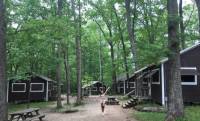"CIEE Camp Exchange USA" program - Types of Summer Camps in USA
Standard Traditional
Can be all girls, all boys, or co-ed and offer a wide range of standard activities to their campers. Traditions such as songs, games, and names are prevalent throughout the camp community. Standard/Traditional camps generally have full summer sessions (7-8 weeks) or half sessions (3 ½ -4 weeks), plus at least one week of training at the start of summer. Activities often include land sports, arts, performing arts, water sports, swimming, rock climbing, high/low ropes, equestrian, excursions to local points of interest, and camping/canoe trips. Directors are typically owners; they purchased the camp or it has been in their family for generations. Larger private camps have directors who oversee programs and staff while the owner is involved in higher-level activities.
Special Needs
The camp population is composed of campers with varying levels of mental and physical disabilities. Special needs camps can be privately owned, non-profit, or affiliated with a religious organization. They offer a wide range of activities that are tailored to allow campers the opportunity to participate, learn, and grow. Special needs camps work with children and adults living with a wide range of physical needs and diagnosed needs such as Autism, Down’s syndrome, and Asperger’s.
Agency / Non-profit
Agency / Non-profit camps are similar to standard/traditional camps and offer a comparable range of activities. These camps are sometimes part of a larger organization and may have programs throughout the year affiliated with that agency/organization. Camp decisions are often mission-based and are sometimes determined by a board of trustees. There is a higher turnover rate with directors and decision makers at agency/non-profit camps; more-so than privately owned camps. Examples: YMCA, Big Brothers Big Sisters, Salvation Army, related environmental or youth-based foundations.
Girl Scout
Girl Scout camps consist of a female camp population, but occasionally hire male staff in key specialist roles. Girl Scout troops and councils are interconnected throughout the country and have regional offices. These camps can vary widely in focus from trips and outdoor education to in-camp activities. Girl Scout camps typically have rustic accommodations. The camper population consists of girl scouts from a variety of locations or specific troops coming together. Camper families are working or middle class, often from rural areas. Camp sessions are 1-2 weeks to accommodate more campers for a lower cost. Camp leadership is young and progressive. Directors and decision makers change every couple of years, and decisions pertaining to camp operations often come down from the larger Girl Scout council rather than camp staff.
Underprivileged
Underprivileged camps are often associated with non-profit organizations. These camps offer a variety of traditional camp activities depending on their location and funding for the year. Underprivileged camps are typically geared towards youth with troubled or difficult backgrounds, but some offer programs for children and their families. Populations include the homeless, victims of abuse, low-income, at-risk, etc. Camps will often grant scholarships, use grant funding, or monetary donations to fund the camper’s tuition. Directors and decision makers have tight budgets, but like incorporating J-1 counselors into their programs.
Specialty Focus
Specialty Focus camps gear their attention towards specific camp activities rather than offering the entire spectrum to campers. There is no limit to what facet a camp could focus on: equestrian, sports, performing arts, circus, outdoor skills, etc. Some specialty camps exclusively serve campers with a specific medical condition, medical situation, or trauma. Campers attend specialty camps for these activities and themes specifically. Specially Focus camps vary in session length, can serve all ages/genders, and can be private or agency/non-profit.
Religious
Most religious camps are affiliated with Christian or Jewish faiths and incorporate religious and non-religious activities. The emphasis on religion varies greatly from camp to camp. Not all religious camps require staff to be actively practicing members of their faith.
